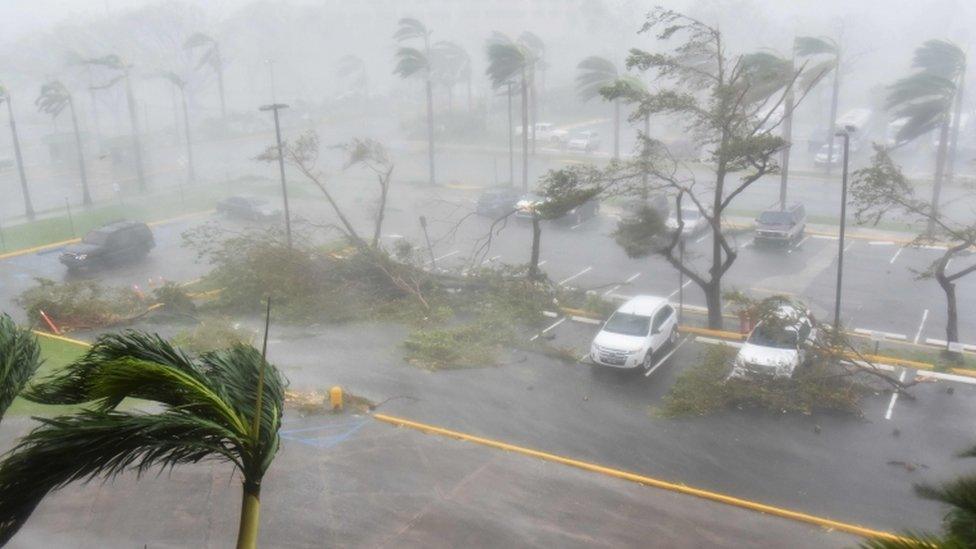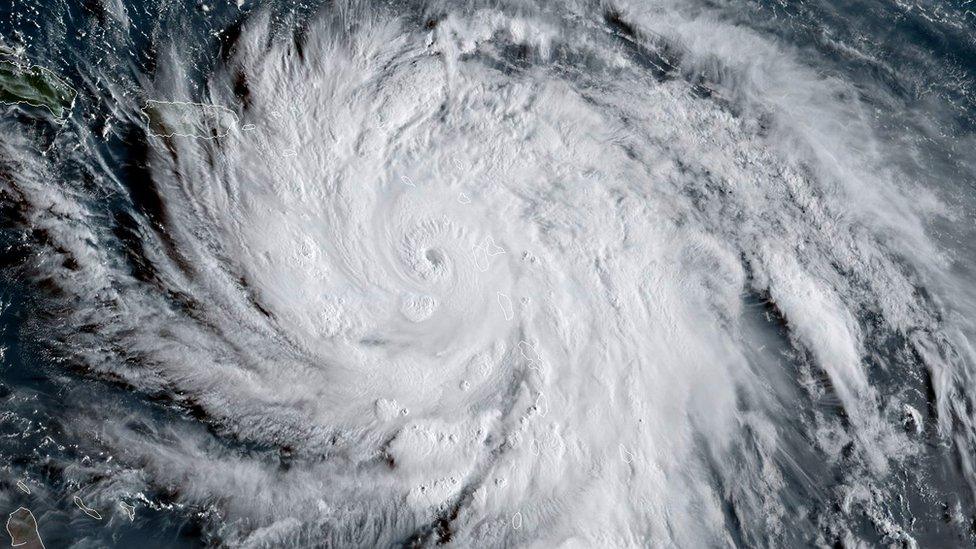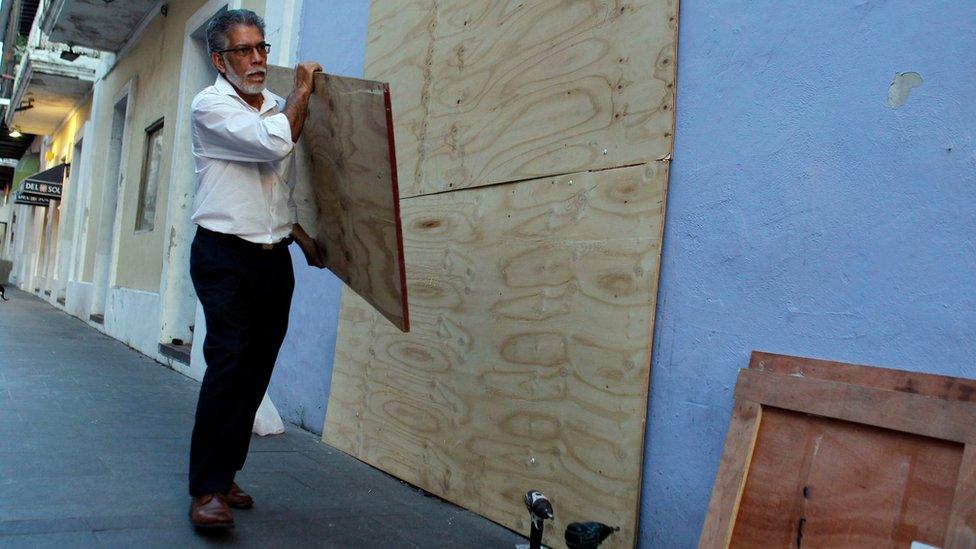Hurricane Maria batters Puerto Rico
- Published
Where has Hurricane Maria hit?
Hurricane Maria, the devastating storm pushing north-west through the Caribbean, is battering Puerto Rico.
The US National Hurricane Center (NHC) said it made landfall in Yabucoa in the east of the US territory, and now has strong winds of 140 mph (225 km/h).
The US territory's governor said damage was inevitable as driving rain and winds hit the Puerto Rican capital.
On the island of Dominica, which was badly affected on Monday, seven people are reported to have been killed.
Aerial footage over the island shows flattened houses and the death toll on Dominica is likely to rise, with details remaining scant as communication links are down.
On Tuesday, Maria ploughed through St Croix in the US Virgin Islands, home to around 55,000 people.
Shortly before making landfall in Puerto Rico, the storm was downgraded from category five to category four by the NHC.
Footage posted on social media showed a torrent of water pouring through the streets of Guayama on the island's south coast.

Palm trees were bent double in Puerto Rico's capital, San Juan
In San Juan, palm trees were bent double and electricity cables were blown loose as debris was thrown through the air.
As of 11:00 local time (1500 GMT) on Wednesday, the eye of the storm was around 20 miles (32km) west of San Juan.
Up to 90% of island residents were without electricity, El Nuevo Dia newspaper quoted Governor Ricardo Rossello as saying.
Mr Rossello earlier told the island's 3.5 million people to seek shelter.
He warned residents to prepare for "the worst storm of the last century" as about 500 shelters were made available to accommodate tens of thousands of people.
"God is with us; we are stronger than any hurricane," Mr Rossello said, external. "Together we will rise again."
Puerto Rico has experienced just one category five storm since 1851 - the Okeechobee Hurricane in 1928.
Hurricane Maria brought high winds to Guadeloupe
Maria is the second storm of this strength to hit the Caribbean this hurricane season - the first being category five Irma earlier in September. Maria began moving roughly along the same track as Irma.
Officials in Puerto Rico feared the debris left by Irma could prove extremely dangerous in the high winds.
There were also concerns that heavy rain could cause landslides in some places, and that a predicted storm surge of up to 9ft (2.7m) could swamp low-lying areas, with "destructive waves" expected to pummel the coast.
The NHC also warned that Maria could deliver several tornadoes over Puerto Rico on Wednesday.

Analysis: Wind-lashed island prays for safety
By Will Grant in San Juan
People across Puerto Rico are just trying to ride out this storm as best they can now. From where we're hunkered down, the powerful winds are creating an incredible noise, rattling storm shutters and doors almost off their hinges.
The electricity is out in our hotel and it is too dark and too dangerous to try to see what is happening outside. Like millions of others, we have little choice at present except to stay put and wait in the darkness for the huge hurricane to pass.
The difficulty is, it is moving slowly - giving Maria more time to unleash its power on the island and its infrastructure. Some projections have shown the storm covering the entire island in the coming hours, hitting Puerto Rico with sustained hurricane force winds and large amounts of rainfall.
Hurricane Maria is now the strongest storm to make landfall on the island in almost a century. Most are just praying that when they can eventually emerge from their places of shelter, they and their loved ones are safe and that the damage hasn't been too extensive.

Are you in an area affected by Hurricane Maria? Share your experience: haveyoursay@bbc.co.uk, external.

What do we know of the damage on Dominica?

Hurricane Maria early on Tuesday
On Wednesday an adviser to Dominica's Prime Minister Roosevelt Skerrit, Hartley Henry, said the full extent of the storm's damage was not yet known and that the death toll was likely to rise.
"It's difficult to determine the level of fatalities but so far seven are confirmed as a direct result of the hurricane," he said.
As a result of the strong winds, roofs had been ripped from dozens of buildings.
"The main general hospital took a beating," Mr Henry said, adding: "Patient care has been compromised."
The first aerial footage of the island confirms "significant damage", Ronald Jackson of the Caribbean Disaster Emergency Management Agency said.
First aerial footage from Dominica
It shows flattened buildings, rivers which have burst their banks and a flooded runway.
Dominica has been virtually cut off with telecommunications severed, but local amateur radio operators say more than 90% of properties have been damaged.
The former British colony, which has a population of 72,000 and is less than 50km long and 25km wide, escaped Hurricane Irma two weeks ago.
But on Monday the eye of the new category five storm passed directly over.
The last communication from the island was from Mr Skerrit just as the storm struck late on Monday, when he said in a Facebook post, external that the winds had swept away the roofs of "almost every person I have spoken to or otherwise made contact with".
Hurricane Maria gathers strength again
Where else has Maria passed?
The storm arrived at 01:00 local time (05:00 GMT) on Wednesday in St Croix, where roughly half the US Virgin Islands' residents live.
On Monday, the French territory of Martinique was hit by power cuts but escaped serious damage.
Footage from Martinique shows early devastating winds
There was flooding in the French territory of Guadeloupe, where one person was killed by a falling tree and another died on the seafront. At least two others were missing after their ship sank near Desirade, the easternmost island in the archipelago.
About 80,000 homes lost power in Guadeloupe.
There are reports of flooding, mudslides and power outages in parts of St Lucia.

Will Irma relief work be affected?
Some islands in Maria's path escaped the worst of Hurricane Irma and have been used as bases to distribute relief to places that were not so fortunate.
Now there are concerns that this work could be jeopardised if they are badly hit, too.

Puerto Ricans have been preparing in the capital, San Juan
Guadeloupe has been a bridgehead for aid going to Irma-hit French territories, while Puerto Rico has also been offering crucial assistance to its neighbours.